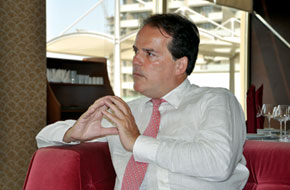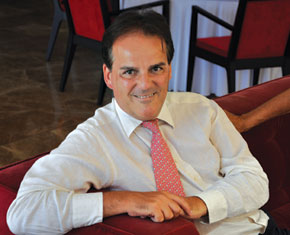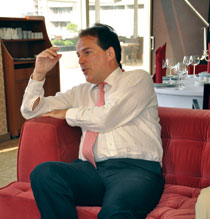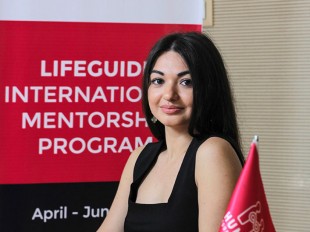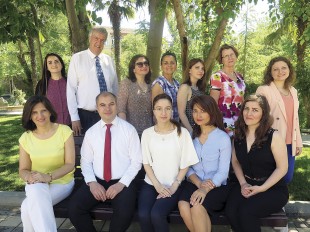Pages 20-24
“Karabagh... is not a zero-sum game... there could be equal benefit for the whole region”
Mark Field, a member of the UK parliament, visited Azerbaijan in July to address a NATO conference on financial security during the global crisis. He is also Chair of the Azerbaijan All Party Parliamentary Group. While here he also agreed to give an interview to ‘Visions of Azerbaijan’.
Firstly, welcome to Azerbaijan.
- Thank you. It’s a very beautiful country and I am very glad to be here, this is my first trip to Baku, and I hope that when we have a longer trip, later in the year, we will go beyond the capital – but there are a lot of things to see here as well.
What is the purpose of your visit to Azerbaijan?
- Well, I was recently elected chairman of the all-party group for Azerbaijan, that is a group in Parliament which has a specific interest in Azerbaijan. It is made up of MPs and members of the House of Lords from all the political parties. We have about 25 members with strong interests and that’s very exciting for relations between the UK and Azerbaijan.
As this is your first visit to Azerbaijan, what is your first impression of our city?
- It is a great, modern Caucasian city. You look at the amount of building that’s going on, clearly it’s a thriving city, with strong investment, which is a good sign of confidence in Azerbaijan. The people are very patriotic and have a proud history. Since independence, over the last 20 years, it has gone from strength to strength. But one of the most important things in my mind was to break away from this idea about Azerbaijan simply being about oil and gas. Obviously there is a much broader range of commercial interests, particularly in financial services; that is one of the reasons why I was keen to take on this role, because my constituency is the City of London and Westminster, which takes in the financial district which can play an important role in bringing together people in the Azerbaijan community with those of the city of London.
As you know we have an important problem in our country, the problem of Nagorno-Karabagh. What can you say about the Nagorno-Karabagh conflict?
- I know that this is a very important conflict and my heart goes out to those people who have got relatives from Nagorno-Karabagh and whose view is that their country is not whole without this being solved. Both the United Nations and the European Union have made their position very clear on this. It is important that there is an Armenian withdrawal and we are working towards that goal in as peaceful a way as we can. For my own part, I have taken up the issue in the British parliament by laying down what is called an Early Day Motion, number 408, to make the case that there needs to be a rapid resolution of these issues. And I know that friends of Azerbaijan in the Bundestag, the German parliament, and the Italian parliament have put motions forward as well and I hope to lead a debate later this year – not just touching on Nagorno-Karabagh, important though it is, so that British parliamentarians should also have an understanding of the importance of trading links, the importance of oil and gas, the importance, obviously, of other commercial interests, simply making the future a so much better place for the young people of Azerbaijan, so that they want to stay here, make their fortunes here and help the country to develop.
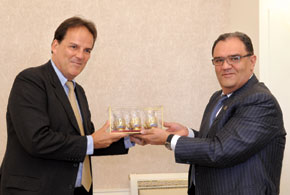 Member of the Milli Majlis, Chingiz Asadullayev, presenting a souvenir to his colleague from the UK, Mark Field What can you say about the role of Azerbaijan in the energy security of Europe and its influence in the region?
Member of the Milli Majlis, Chingiz Asadullayev, presenting a souvenir to his colleague from the UK, Mark Field What can you say about the role of Azerbaijan in the energy security of Europe and its influence in the region?
- You’re quite right that energy security is at the forefront of our minds, particularly for the United Kingdom. As you may know we have had some oil and gas from the North Sea, but that is diminishing and therefore energy is all the more important. One thing I feel strongly about is that there is a mix of energies; obviously we are looking at renewables, solar energy and wind energy in particular in the United Kingdom.... Essentially in the foreseeable future oil and gas are going to remain extremely important. As you know there was a contract signed some 15 years ago on oil production, and the links with BP here are very important. ... I think that energy security is going to be one of the very big issues in the next 4 or 5 years and that can only work by fostering even stronger relations between our countries.
Do you think that if the Nagorno-Karabagh conflict is resolved that Azerbaijan will have more influence in the region?
- I think it’s in everyone’s interests to have a peaceful arrangement here - both Azerbaijani and Armenian interests– actually it might be even more in their interest that this is resolved, so that they too can play their part across the world like the Azerbaijanis. I think one of the important things to stress, to give candid advice to Azerbaijan, is that this is not what we call a ‘zero-sum’ game. It’s not that one country will win and the other will lose. Hopefully, if there is a peaceful resolution, there is a sense that both countries are looking towards greater opportunity, where there could be strong economic and political ties and equal benefit for the whole region. This region has such a lot going for it; it’s got lovely people, and in the longer term it’s a fantastic tourist location as well – and we need to make the case that with all the countries together it can be quite a place.
Could you tell us more about the role of the Parliamentary group? How does it want to affect relations between the UK and Azerbaijan?
- I think one of the main roles is this: perhaps too often there is a sense that Azerbaijan is linked together with a whole lot of other countries and the case hasn’t been made strongly enough about the unique and individual aspects of Azerbaijan, and your organisation (The European Azerbaijan Society – ed.) has worked extremely well at raising the profile, particularly with young parliamentarians, and one of the things I’m encouraged by is that of the 25 members there are some very established people from the House of Lords who have always had a long-standing passion for this area. We’ve also got quite a new intake who have expressed an interest, on both sides – Coalition members, but also Labour Party members and that augurs well for making the case for what Azerbaijan is all about and that it’s more than just oil and gas.
What are the other issues, apart from the conflict and oil and gas?
- One thing that’s evident to me is that with the affluence that comes with high quality oil and gas; unlike the United Kingdom, Azerbaijan is going to be in the position of having plentiful supplies of both these for centuries to come. This creates a tremendous opportunity to develop infrastructure, to build wealth for future generations and one other element is the financial services world. I think that in each of those three categories, the very strong relationship between Azerbaijan and the United Kingdom can be enhanced. As a representative of the City of London and Westminster, my interests have focused on financial services and the economic front, and so I hope to play some role in linking the interests that quite a lot of the leading lights in Azerbaijan have, to ensure that some of that work goes to the city of London, so that the expertise there helps to improve things in Azerbaijan in the years ahead.
Do you think that the parliamentary group can encourage investment in Azerbaijan?
- I hope so. I hope that, above all, it will make the case for Azerbaijan as a unique entity. And of course, the other side is investment in the UK by Azerbaijan. We have got very good connections between the two countries, but it’s fair to say that they haven’t been exploited in quite the way they might have been, and I hope that there will be significant Azerbaijani investment in UK interests in years to come.
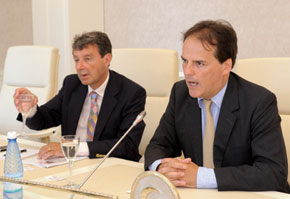 Mark Field and Lionel Zetter, Member of TEAS Advisory Board, at a meeting with Azerbaijani parliamentarians in the Milli Majlis So we can expect a higher profile for Azerbaijan?
Mark Field and Lionel Zetter, Member of TEAS Advisory Board, at a meeting with Azerbaijani parliamentarians in the Milli Majlis So we can expect a higher profile for Azerbaijan?
- I hope so. That’s often what these parliamentary groups are about – a higher profile amongst parliamentarians means more debates and that tends to raise the profile; you can see with other countries how it’s worked quite well with high profile campaigns. On the commercial side... (there are) opportunities that can be grasped if you have a concerted effort through the parliamentary channel.
What do you hope to achieve by the Early Day Motion that you mentioned earlier?
- When I was speaking to Azerbaijan parliamentarians yesterday, they were aware that there had been similar protocols in both the German and Italian parliaments and I wanted to make sure that we could open a debate in the way that they are in those other parliaments - this was an opportunity to do something in the UK parliament. These things make a difference; inevitably they are picked up by the press, the Foreign Office become aware of it. There’s a heightened interest in Azerbaijani affairs and that can only be a positive thing.
And what role do you think the diaspora and The European Azerbaijan Society can play?
- It can play a tremendously important role. I think that organisations like TEAS do a tremendous amount of work and again making the case that there’s a specific case for Azerbaijan, because all too often – maybe it’s a British thing – we’ve tended to link Eastern Europe together, as though it was a homogenous state. The same applies to the Caucasian states and this is one of the most important ways that we can show that not only is there a rich history – the unique history that Azerbaijan has – but that it needs to be treated differently in the future.
Do you think there can be formal or informal relationships with the parliamentary group?
- Oh, I very much hope so. One of the things we are hoping to do is to lead a further delegation later in the year. This time we attended the NATO conference on Friday and met with parliamentarians; this was very much a starting point. But in reciprocation we also want to see Azerbaijani parliamentarians with an interest in the United Kingdom coming to London and other parts of the UK as well. It will help raise the profile... one of the positive things last year was when the City of London’s Lord Mayor, Ian Luder, came over to Azerbaijan, I think it was the first time there had been a visit to Azerbaijan and I hope that we can use that as a starting point for much closer relations, in the commercial sense, between the two countries.
The issue of Karabagh is crucial and dominant in Azerbaijan. To have 15% or more of your country occupied affects every aspect of life. It’s not just the tragedies of the deaths and refugees, it also has economic impact and it is a huge drain on the country. The view from Azerbaijan is that there have now been negotiations for 17 years. They are told ‘be patient’, ‘we want a peaceful settlement’ etc. If we asked you to imagine that, say, the French invaded Kent and Sussex, would the UK sit down with independent negotiators for 17 years?
- I do understand the passion that is felt here in Azerbaijan but history tends to suggest that things can move very quickly. I understand that Azerbaijanis think, “‘well 17 years has gone by, 17 becomes 20, 20 becomes 25 very quickly and people forget about these things”, but actually things move beneath the surface. If I could give just one example....much closer to home for the United Kingdom is what happened in Northern Ireland. From 1969 to the late 1970s and early 1980s there were masses and masses of killings. There seemed to be an impasse and then suddenly things moved quickly and now there’s a lasting political settlement there. That isn’t to say that there isn’t an element of suspicion between the various communities, but we’re in a far better situation than we were 25 or 30 years ago, when literally dozens of people were being killed in the streets day in and day out. So I wouldn’t want to be complacent, and I think it’s absolutely right and legitimate, not just for you to ask me these questions, but more importantly to raise the profile of this issue, so that it isn’t forgotten about in the councils of Europe.
People know that there’s a very, very clear judgement from both the United Nations and the EU about Armenia’s position. Armenia must realise that to an extent it remains, because of this issue, a pariah for the investment that it would want to have, and I think that having that economic concern might well help to bring this issue to resolution. I know that it is slow and that when anyone has a very confident sense of the justice of their case, there are great frustrations, but I think there are some plates moving beneath the surface, so we have got to do our best to make sure that process continues
.... You have to look at the future on these issues: the next generation of Azerbaijanis, the next generation of Armenians – hopefully, it will be a better place for them and this running sore of Karabagh can only act to the detriment of future generations.
One final comment on this issue.... there have been four UN resolutions, all of which have said Armenian troops should leave the areas they have occupied and, after 17 years, it still hasn’t happened....
- I think the justice that is there in the Azerbaijani case has to be reinforced. I am confident that not only is justice on the side here, but you will see that beneath the surface there are those plates moving and they can move more quickly than you may imagine.
Turning to your more general interest in Azerbaijan. What do you notice in terms of the society, the culture etc?
- I noticed that it’s very hot, but that’s what you get for coming over at this time of year! But I do love hot weather! Actually the one thing that’s very evident is that you see a lot of cheerful people on the streets. I’ve been to other cities in other parts of the world where you have a sense of some sort of foreboding about life, but here people are clearly cheerful – there are a lot of young people on the streets and certainly with the people we’ve met – a relatively small number – there’s been a real sense that the country is coming into its own. There’s a sense of confidence. Actually it’s quite rare to come to a big capital city these days and see so many cranes. That’s obviously a very strong vote for the future of this country – not just from Azerbaijanis themselves, but from foreign investors – a good enough reason for putting a smile on the face of everyone here in Baku.
There was one other point....
- The next World Cup? (the interview was held on the day of the World Cup final – ed.)
Well, Tony Adams is going to sort that out
Of course, we met Tony, yes. He was talking with great enthusiasm about the work he’s doing at the academy level for the club he’s taking over (Qabala FC – ed.). He’s got a 3 year plan to get the club up to winning the Azerbaijani championship, obviously he’ll be building up a culture of young players with really good skills. It may not be good enough for the next World Cup but, perhaps by 2018.
....You have only recently come to your position, but the history of connections between Britain and Azerbaijan go back over one hundred years, particularly during the oil boom at the start of the last century. Can this be an encouragement for the parliamentary group to establish what connections there are between Azerbaijan and Britain? It’s not just a remote country – there is a history to the relationship.
- Yes, we should play on this unique history. It’s not just a lot of countries that used to be in the Soviet Union. Part of this process is to build on this sense of a history and I’ll be working with TEAS to get that sort of message over as well. In a sense, it’s restoring a close relationship that our people have had that perhaps went into hibernation between 1920 and the early 1990s, and we need to bring that back into play.
Thank you very much, Mr Field, we hope you enjoy the rest of your visit to Azerbaijan.
Note: Mark Field MP submitted the following Early Day Motion to the UK’s House of Commons on 6 July 2010:
“That this House calls on the Government to urge the OSCE Minsk group to bring talks over the occupation of Nagorno Karabakh and seven surrounding regions by Armenian troops to a speedy conclusion based on the Madrid Principles; maintains that this is essential in order that almost one million Azerbaijani refugees and internally displaced people can return to their homes; notes that UN Security Council resolutions numbers 822, 853, 874 and 884 all call for the withdrawal of Armenian troops; also notes that on 20 May 2010 the European Parliament passed a resolution demanding the withdrawal of Armenian troops; and further notes that on 21 May 2010 EU High Representative Baroness Catherine Ashton labelled the June 2010 election in the occupied territories as unconstitutional and illegal.”
“Karabagh... is not a zero-sum game... there could be equal benefit for the whole region”
Mark Field, a member of the UK parliament, visited Azerbaijan in July to address a NATO conference on financial security during the global crisis. He is also Chair of the Azerbaijan All Party Parliamentary Group. While here he also agreed to give an interview to ‘Visions of Azerbaijan’.
Firstly, welcome to Azerbaijan.
- Thank you. It’s a very beautiful country and I am very glad to be here, this is my first trip to Baku, and I hope that when we have a longer trip, later in the year, we will go beyond the capital – but there are a lot of things to see here as well.
What is the purpose of your visit to Azerbaijan?
- Well, I was recently elected chairman of the all-party group for Azerbaijan, that is a group in Parliament which has a specific interest in Azerbaijan. It is made up of MPs and members of the House of Lords from all the political parties. We have about 25 members with strong interests and that’s very exciting for relations between the UK and Azerbaijan.
As this is your first visit to Azerbaijan, what is your first impression of our city?
- It is a great, modern Caucasian city. You look at the amount of building that’s going on, clearly it’s a thriving city, with strong investment, which is a good sign of confidence in Azerbaijan. The people are very patriotic and have a proud history. Since independence, over the last 20 years, it has gone from strength to strength. But one of the most important things in my mind was to break away from this idea about Azerbaijan simply being about oil and gas. Obviously there is a much broader range of commercial interests, particularly in financial services; that is one of the reasons why I was keen to take on this role, because my constituency is the City of London and Westminster, which takes in the financial district which can play an important role in bringing together people in the Azerbaijan community with those of the city of London.
As you know we have an important problem in our country, the problem of Nagorno-Karabagh. What can you say about the Nagorno-Karabagh conflict?
- I know that this is a very important conflict and my heart goes out to those people who have got relatives from Nagorno-Karabagh and whose view is that their country is not whole without this being solved. Both the United Nations and the European Union have made their position very clear on this. It is important that there is an Armenian withdrawal and we are working towards that goal in as peaceful a way as we can. For my own part, I have taken up the issue in the British parliament by laying down what is called an Early Day Motion, number 408, to make the case that there needs to be a rapid resolution of these issues. And I know that friends of Azerbaijan in the Bundestag, the German parliament, and the Italian parliament have put motions forward as well and I hope to lead a debate later this year – not just touching on Nagorno-Karabagh, important though it is, so that British parliamentarians should also have an understanding of the importance of trading links, the importance of oil and gas, the importance, obviously, of other commercial interests, simply making the future a so much better place for the young people of Azerbaijan, so that they want to stay here, make their fortunes here and help the country to develop.
 Member of the Milli Majlis, Chingiz Asadullayev, presenting a souvenir to his colleague from the UK, Mark Field
Member of the Milli Majlis, Chingiz Asadullayev, presenting a souvenir to his colleague from the UK, Mark Field - You’re quite right that energy security is at the forefront of our minds, particularly for the United Kingdom. As you may know we have had some oil and gas from the North Sea, but that is diminishing and therefore energy is all the more important. One thing I feel strongly about is that there is a mix of energies; obviously we are looking at renewables, solar energy and wind energy in particular in the United Kingdom.... Essentially in the foreseeable future oil and gas are going to remain extremely important. As you know there was a contract signed some 15 years ago on oil production, and the links with BP here are very important. ... I think that energy security is going to be one of the very big issues in the next 4 or 5 years and that can only work by fostering even stronger relations between our countries.
Do you think that if the Nagorno-Karabagh conflict is resolved that Azerbaijan will have more influence in the region?
- I think it’s in everyone’s interests to have a peaceful arrangement here - both Azerbaijani and Armenian interests– actually it might be even more in their interest that this is resolved, so that they too can play their part across the world like the Azerbaijanis. I think one of the important things to stress, to give candid advice to Azerbaijan, is that this is not what we call a ‘zero-sum’ game. It’s not that one country will win and the other will lose. Hopefully, if there is a peaceful resolution, there is a sense that both countries are looking towards greater opportunity, where there could be strong economic and political ties and equal benefit for the whole region. This region has such a lot going for it; it’s got lovely people, and in the longer term it’s a fantastic tourist location as well – and we need to make the case that with all the countries together it can be quite a place.
Could you tell us more about the role of the Parliamentary group? How does it want to affect relations between the UK and Azerbaijan?
- I think one of the main roles is this: perhaps too often there is a sense that Azerbaijan is linked together with a whole lot of other countries and the case hasn’t been made strongly enough about the unique and individual aspects of Azerbaijan, and your organisation (The European Azerbaijan Society – ed.) has worked extremely well at raising the profile, particularly with young parliamentarians, and one of the things I’m encouraged by is that of the 25 members there are some very established people from the House of Lords who have always had a long-standing passion for this area. We’ve also got quite a new intake who have expressed an interest, on both sides – Coalition members, but also Labour Party members and that augurs well for making the case for what Azerbaijan is all about and that it’s more than just oil and gas.
What are the other issues, apart from the conflict and oil and gas?
- One thing that’s evident to me is that with the affluence that comes with high quality oil and gas; unlike the United Kingdom, Azerbaijan is going to be in the position of having plentiful supplies of both these for centuries to come. This creates a tremendous opportunity to develop infrastructure, to build wealth for future generations and one other element is the financial services world. I think that in each of those three categories, the very strong relationship between Azerbaijan and the United Kingdom can be enhanced. As a representative of the City of London and Westminster, my interests have focused on financial services and the economic front, and so I hope to play some role in linking the interests that quite a lot of the leading lights in Azerbaijan have, to ensure that some of that work goes to the city of London, so that the expertise there helps to improve things in Azerbaijan in the years ahead.
Do you think that the parliamentary group can encourage investment in Azerbaijan?
- I hope so. I hope that, above all, it will make the case for Azerbaijan as a unique entity. And of course, the other side is investment in the UK by Azerbaijan. We have got very good connections between the two countries, but it’s fair to say that they haven’t been exploited in quite the way they might have been, and I hope that there will be significant Azerbaijani investment in UK interests in years to come.
 Mark Field and Lionel Zetter, Member of TEAS Advisory Board, at a meeting with Azerbaijani parliamentarians in the Milli Majlis
Mark Field and Lionel Zetter, Member of TEAS Advisory Board, at a meeting with Azerbaijani parliamentarians in the Milli Majlis - I hope so. That’s often what these parliamentary groups are about – a higher profile amongst parliamentarians means more debates and that tends to raise the profile; you can see with other countries how it’s worked quite well with high profile campaigns. On the commercial side... (there are) opportunities that can be grasped if you have a concerted effort through the parliamentary channel.
What do you hope to achieve by the Early Day Motion that you mentioned earlier?
- When I was speaking to Azerbaijan parliamentarians yesterday, they were aware that there had been similar protocols in both the German and Italian parliaments and I wanted to make sure that we could open a debate in the way that they are in those other parliaments - this was an opportunity to do something in the UK parliament. These things make a difference; inevitably they are picked up by the press, the Foreign Office become aware of it. There’s a heightened interest in Azerbaijani affairs and that can only be a positive thing.
And what role do you think the diaspora and The European Azerbaijan Society can play?
- It can play a tremendously important role. I think that organisations like TEAS do a tremendous amount of work and again making the case that there’s a specific case for Azerbaijan, because all too often – maybe it’s a British thing – we’ve tended to link Eastern Europe together, as though it was a homogenous state. The same applies to the Caucasian states and this is one of the most important ways that we can show that not only is there a rich history – the unique history that Azerbaijan has – but that it needs to be treated differently in the future.
Do you think there can be formal or informal relationships with the parliamentary group?
- Oh, I very much hope so. One of the things we are hoping to do is to lead a further delegation later in the year. This time we attended the NATO conference on Friday and met with parliamentarians; this was very much a starting point. But in reciprocation we also want to see Azerbaijani parliamentarians with an interest in the United Kingdom coming to London and other parts of the UK as well. It will help raise the profile... one of the positive things last year was when the City of London’s Lord Mayor, Ian Luder, came over to Azerbaijan, I think it was the first time there had been a visit to Azerbaijan and I hope that we can use that as a starting point for much closer relations, in the commercial sense, between the two countries.
The issue of Karabagh is crucial and dominant in Azerbaijan. To have 15% or more of your country occupied affects every aspect of life. It’s not just the tragedies of the deaths and refugees, it also has economic impact and it is a huge drain on the country. The view from Azerbaijan is that there have now been negotiations for 17 years. They are told ‘be patient’, ‘we want a peaceful settlement’ etc. If we asked you to imagine that, say, the French invaded Kent and Sussex, would the UK sit down with independent negotiators for 17 years?
- I do understand the passion that is felt here in Azerbaijan but history tends to suggest that things can move very quickly. I understand that Azerbaijanis think, “‘well 17 years has gone by, 17 becomes 20, 20 becomes 25 very quickly and people forget about these things”, but actually things move beneath the surface. If I could give just one example....much closer to home for the United Kingdom is what happened in Northern Ireland. From 1969 to the late 1970s and early 1980s there were masses and masses of killings. There seemed to be an impasse and then suddenly things moved quickly and now there’s a lasting political settlement there. That isn’t to say that there isn’t an element of suspicion between the various communities, but we’re in a far better situation than we were 25 or 30 years ago, when literally dozens of people were being killed in the streets day in and day out. So I wouldn’t want to be complacent, and I think it’s absolutely right and legitimate, not just for you to ask me these questions, but more importantly to raise the profile of this issue, so that it isn’t forgotten about in the councils of Europe.
People know that there’s a very, very clear judgement from both the United Nations and the EU about Armenia’s position. Armenia must realise that to an extent it remains, because of this issue, a pariah for the investment that it would want to have, and I think that having that economic concern might well help to bring this issue to resolution. I know that it is slow and that when anyone has a very confident sense of the justice of their case, there are great frustrations, but I think there are some plates moving beneath the surface, so we have got to do our best to make sure that process continues
.... You have to look at the future on these issues: the next generation of Azerbaijanis, the next generation of Armenians – hopefully, it will be a better place for them and this running sore of Karabagh can only act to the detriment of future generations.
One final comment on this issue.... there have been four UN resolutions, all of which have said Armenian troops should leave the areas they have occupied and, after 17 years, it still hasn’t happened....
- I think the justice that is there in the Azerbaijani case has to be reinforced. I am confident that not only is justice on the side here, but you will see that beneath the surface there are those plates moving and they can move more quickly than you may imagine.
Turning to your more general interest in Azerbaijan. What do you notice in terms of the society, the culture etc?
- I noticed that it’s very hot, but that’s what you get for coming over at this time of year! But I do love hot weather! Actually the one thing that’s very evident is that you see a lot of cheerful people on the streets. I’ve been to other cities in other parts of the world where you have a sense of some sort of foreboding about life, but here people are clearly cheerful – there are a lot of young people on the streets and certainly with the people we’ve met – a relatively small number – there’s been a real sense that the country is coming into its own. There’s a sense of confidence. Actually it’s quite rare to come to a big capital city these days and see so many cranes. That’s obviously a very strong vote for the future of this country – not just from Azerbaijanis themselves, but from foreign investors – a good enough reason for putting a smile on the face of everyone here in Baku.
There was one other point....
- The next World Cup? (the interview was held on the day of the World Cup final – ed.)
Well, Tony Adams is going to sort that out
Of course, we met Tony, yes. He was talking with great enthusiasm about the work he’s doing at the academy level for the club he’s taking over (Qabala FC – ed.). He’s got a 3 year plan to get the club up to winning the Azerbaijani championship, obviously he’ll be building up a culture of young players with really good skills. It may not be good enough for the next World Cup but, perhaps by 2018.
....You have only recently come to your position, but the history of connections between Britain and Azerbaijan go back over one hundred years, particularly during the oil boom at the start of the last century. Can this be an encouragement for the parliamentary group to establish what connections there are between Azerbaijan and Britain? It’s not just a remote country – there is a history to the relationship.
- Yes, we should play on this unique history. It’s not just a lot of countries that used to be in the Soviet Union. Part of this process is to build on this sense of a history and I’ll be working with TEAS to get that sort of message over as well. In a sense, it’s restoring a close relationship that our people have had that perhaps went into hibernation between 1920 and the early 1990s, and we need to bring that back into play.
Thank you very much, Mr Field, we hope you enjoy the rest of your visit to Azerbaijan.
Note: Mark Field MP submitted the following Early Day Motion to the UK’s House of Commons on 6 July 2010:
“That this House calls on the Government to urge the OSCE Minsk group to bring talks over the occupation of Nagorno Karabakh and seven surrounding regions by Armenian troops to a speedy conclusion based on the Madrid Principles; maintains that this is essential in order that almost one million Azerbaijani refugees and internally displaced people can return to their homes; notes that UN Security Council resolutions numbers 822, 853, 874 and 884 all call for the withdrawal of Armenian troops; also notes that on 20 May 2010 the European Parliament passed a resolution demanding the withdrawal of Armenian troops; and further notes that on 21 May 2010 EU High Representative Baroness Catherine Ashton labelled the June 2010 election in the occupied territories as unconstitutional and illegal.”
